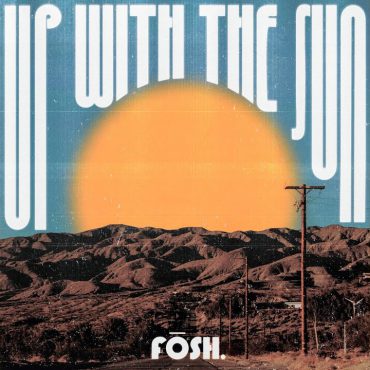Listeners:
Top listeners:
-
play_arrow
WPTS-FM


bio by Courtney Lucier; interview by Sarah Thomson
Rosie Tucker (they/them) is an indie singer/song-writer based in Los Angeles. They grew up in a very Christian family, their mother having a background in computer programming and their father having served in the United States Marines. They studied music at the University of Southern California, and are now touring the country after releasing their newest album Sucker Supreme in 2021. Some of their most popular songs include “Gay Bar” and “Lauren” from the album Never Not, and “Habanero” from their most recent album Sucker Supreme. As they have once said in an interview with “When the Horn Blows” their album covers many themes, of “sex, romance, the American Midwest, consumer protections, gender fluidity, liminal spaces, reptiles, and forgiveness.”
Interview from November 2023.
Sarah: So I know you’re only a couple of stops into your tour, but how are you liking it so far?
Rosie: My God. It’s been so fun. This is a solo acoustic tour, and ordinarily, and for many years, I’ve been touring with a rock band, so it has been amazing and thrilling and scary to be performing alone, but it’s awesome. It’s delightful. It’s a delight.
Sarah: So you’ve toured before. And you’re pretty used to it?
Rosie: Yes, I would say I am not as used to it as I once was because we all lived through a pandemic. I had been touring a fair amount and then we all lived through a pandemic. But I feel like it has definitely been a process of getting back into touring. For a long time there were still a lot of outstanding safety concerns to be reckoned with, so touring was very stressful. Just trying to deliver everyone safely from town to town every single night was just a lot. But this tour, I am just driving with one other person, and it’s been comparatively so easy because there’s much fewer logistics.
Sarah: Have you noticed a difference with the audience from before and after?
Rosie: That’s a good question. I think that because I have more music out now, people know a lot more of the songs and people are really kind. I don’t know if I can speak totally to the audiences of the past. People are always pretty kind to touring musicians in my experience. But playing alone and playing for people who know the songs and are singing along and are there to experience them in this different format has just been really satisfying. It’s so sweet. People are so nice. It’s really cute. I’m traveling with my partner Wolfie, and every time someone will come up and talk to us and walk away, we just both go “cute! cute!” It’s very endearing.
Sarah: Do people make you stuff?
Rosie: A few people have made me stuff, yes. Someone in Chicago made little beaded bracelets, song titles. I have a song called Creature of Slime, and somebody made a crocheted slime creature for me in Columbus. That was a very high effort gift.
Sarah: Have you been to Pittsburgh before? Are you excited to perform?
Rosie: I performed in Pittsburgh and I was opening for a band called the Beths in summer of 2022. They’re amazing. They’re so good. We played in Pittsburgh then, and I played in Pittsburgh in 2019, and I’ve been to Pittsburgh a fair number of times, just kind of visiting. I think it’s a beautiful city. I feel like people from Pittsburgh- I was talking to someone about this last night in Columbus where I was like, “we’re going to Pittsburgh.” And they were like, my God, Pittsburgh is beautiful. And I was like, yes, but no one from Pittsburgh thinks so. Like, for people who are from here, it’s fine. It’s fine. And everyone who comes there is like, my God, this place is amazing.
Sarah: For your most recent album, Sucker Supreme, that came out in 2021- who/what would you say is your main inspiration for this album?
Rosie: I have to think. I have to throw myself back. We recorded it before the COVID-19 pandemic. It’s like a whole lifetime away. I mean, I think that a lot of the inspiration for this album, song wise, I was just sharing what songs had occurred to me over a natural period of time. But production-wise, we were definitely trying to create something more lush, more produced. As for sonic Inspirations, at this point, it kind of feels lost to life.
Sarah: It’s just been so long. Do you feel differently about it? Does it mean something different to you now than it did then?
Rosie: I think yes. In that sense, I am far removed from having to promote it in any way. I can just kind of appreciate it as this moment in time. I think there’s kind of a franticness around releasing and promoting music, and I’m working on this, but you’re sharing it with people. You’re hoping that people will enjoy it. There’s all of this work to try and create interest when you share something initially. But what is so beautiful about making albums is they just persist forever. And so many of my favorite albums are decades and decades old and I’ve just come upon them and they’ve moved me. So I think that the more time I have from any of my music, the more I’m able to enjoy it. And I don’t feel as self-conscious. I just can feel the love for it.
Sarah: What artists have inspired you musically from those albums that you’ve seen from the past? What examples?
Rosie: I’m not listening to her as much, but in the past, there’s an artist named Sybil Baer. I don’t remember what label her stuff was reissued on, but she just was a woman who recorded a bunch of folk songs on a four track in her home when she was 20 something in Germany in the seventies, I think, and never showed them to anybody and then died. And her son went through all of them and was like “holy moly my mom is an amazing songwriter” and they’re just stunning, poetically. They’re beautiful. It’s just acoustic and voice. So that is a past album that was very, very formative for me.
Sarah: Are you really into folk as a genre?
Rosie: There was a time in my life when I was. But no, not at this point. I’m very out of touch with folk music as it stands right now.
Sarah: What do you think about newer folk like Big Thief as an example?
Rosie: There was a time when I enjoyed them. I had the Adrienne Lenker/Buck Meek record, and I was spinning it in my car for a year. I feel like Big Thief is extremely prolific and I’m not particularly following along. None of that music has really made its way to me and stunned me. I don’t know, there’s so much music happening all of the time now that I feel like I am not trying to keep up with anyone who would be seen as my contemporaries. If I know someone I’ll listen to them, if they’re a person who I love, I will probably listen.
Sarah: What genres do you pay attention to? What do you look for to listen to normally?
Rosie: I will throw on like the Spotify math rock playlists. I’ve listened to that stuff for a long time. I interned at a math rock label in college. I’ve been in bands that have flirted in that direction genre-wise. But I’m thinking about the more artsy edges of rap. I really like a rapper named Pink Siifu, for example. There is a rapper named Rap Ferreira who is probably the most influential writer for me in terms of music, writing like poetry. Noname is an incredible influence. Should, will, be remembered by history as just a brilliant genius person who is also an organizer and an activist, and is one of the best writers out here in the world. Other than that, in terms of new stuff like random, random electronic-type stuff, I like some of the contemporary jazz that is happening. If I just want to put something on and be moved by music and not be too disrupted by like, “are the lyrics good? Is the voice good?” There’s a jazz record called Work Money Death that I’m very into right now.
Sarah: What do you pay attention to when you’re thinking about if something’s good; are you listening to the lyrics or the vocals or instrumentals?
Rosie: That is such a good question. And I don’t know if I can ask it back to you, but I also want to know what you think about that. I think first and foremost there’s a gut reaction- and I think that’s what’s so powerful about music, is that there are multiple elements happening in a song like the quality of a person’s voice, the quality of the recording, the quality of the musicianship, the lyrics, these things that all have to come together to create something that causes kind of an involuntary affinity. And it’s either there or it’s not. So I love when someone has good lyrics, and I think because I care about that in my own art, people tend to think that’s what I’m looking for. But it’s not at all. It’s not at all what I’m looking for. Because that’s not the only purpose of music. Dancing is like music’s other entire landscape, almost way more so than song or story is. Trying to get people moving. The lyrics don’t matter hardly at all in that whole sector of the art. So yeah, it’s a gut thing, definitely. What about you?
Sarah: I definitely agree with you because I listen to a lot of screamo and in that the lyrics are virtually incomprehensible a lot of the time. So when there’s good screamo, it means there’s good instrumentals and it’s emotion-based. You can tell that someone means it. Most of the time, what makes something good is how genuine it is.
Rosie: Well, it’s very interesting too, if you’re listening to a lot of one genre, because everyone, for the most part, will be playing with the same conventions. That’s what makes it a genre. Everyone is screaming, the guitars are generally using the same type of tone and doing the same thing. But obviously it’s not all created equal. Some of it is really bad, some of it you think, oh this should be good, but it’s just not hitting.
Sarah: What do you think about the concept within the indie genre? Because it’s very easy to make indie music and I feel like it’s very easy to make bad indie music.
Rosie: I’m so grateful to you for saying that. I am trying to sort through a lot of opinions. I think you’re completely right. It’s incredibly easy to make this music and it is incredibly easy to make it badly. There is a positive way of relating to this where I think we have a proliferation of recording equipment that is more available to people than ever. We have people who historically would have been kept out of audio spaces who are engaging in music production, who might not have been included necessarily in certain forms of musicianship that are trying things out for themselves. I’m thinking about Riot Grrrl and like, how many of those bands were made up of non-musicians? Noninstrumentalists. Indie does certainly lack the kind of overarching political bite of that movement, so the comparison is pretty short.
Sarah: No, I also know a lot about Riot Grrrl, so I agree with you completely on this.
Rosie: Excellent. Excellent. So yeah, there’s not a strong overarching political conviction in the genre and I think it’s really unfortunate in many ways the degree to which musicianship is not valued or that important. And there’s nothing that I can do about it or anyone can do about it. And I think that there will always be people who enjoy listening to music that sounds shaggy and homemade and amateur, even when sometimes it’s being made in very expensive studios. And there’s nothing wrong with people having that taste. But for me, this is a large part of why I generally am not trying to follow along, even though I am making music that is qualified as indie rock. I’m not trying to follow along in the genre because there’s just so much exciting music being made right now by people whose horizons seem to be a lot wider.
Sarah: How did you become interested in writing music originally? You went to school for music, what was the thought process that led to that?
Rosie: I was able to go to school for music because I have affluent parents who supported me in pursuing this career, which is an incredibly unreasonable life path. But when it comes to writing music, I think it’s just the first thing that I wanted to do. I had piano lessons as a kid and as soon as there was an instrument for me to play, I was making up stuff to sing with it. The creation and the act of music making and the creation of new stuff has always been very hand in hand for me.
Sarah: What do you think is hard about that? Are there any challenges for you?
Rosie: Yeah. Writing anything is hard. I think that making instrumental music is easier. It takes practice and time to become excellent at an instrument. But there are many conventions of music theory, which can provide a path forward. Maybe you’re like, I want this section to do something slightly different. We can utilize speed or harmony or a choice of instrument to bring about a specific emotion. So I think that the hardest part is always the words. And that’s true of any writing of words. I feel like it doesn’t matter how much writing you’ve done in your life, whether it’s music criticism, whether it’s journalism, whether it’s fiction, poetry, rap, song. It’s just really difficult to bring syllables together in a way that feels musical and also speaks to some truth which previously you had not been able to articulate.
Sarah: Do you normally do instrumentals first? You just have a bunch of instrumentals sitting around?
Rosie: No, that would be cool. That would be really cool. I think it’s much harder to write words to instrumental because when I write the things tend to happen simultaneously. I will just be playing and singing and something will emerge. I have kind of a backlog of ideas- I’m into this guitar shape right now, and I’m into this sentence that I’ve been playing with right now, and I’m trying to marry these things. And when melody and lyric emerge at the same time, it’s so much more powerful because the syllables are part of the music, whereas trying to write over an instrumental, it is just harder to drag the language into the gooey place of the musicalness.
Sarah: What advice would you give to new singers, new songwriters, people in your genre, people outside your genre?
Rosie: I think that I would tell people to listen to everything that they can find. Not just music from your time period, not just music and languages that you speak. Not just music that your friends listen to. If you can summon a kind of ravenous curiosity for all of the different ways that human beings have been recording what passes for music, which is sometimes chaotic and noisy and barely tonal and stuff like that- if you can start to relate to that impulse in all of its very many forms in which it occurs in humanity, I think you’re going to make a lot more interesting music. And I think that I do not want to be a gatekeeper, and playing and recording yourself at all is the most important thing. I want as few barriers around that for people as possible. I want every single person to experience the joy of creating music that is their own. If that means using loops, for example, then use loops. If it means that you can’t play the guitar that well, but it gives you something when you’re playing the two chords that you know and you want to sing over it, do it, absolutely do that. Have a practice where you are not thinking about what any other person thinks of your playing, not thinking about what anyone would ever look at, but you yourself can desire and endeavor to be more skilled at part of the musical end of the craft. Pursue it as much as you can, whenever you can. If you can find joy in practicing your instrument that also is going to make your music so much better.
Written by: wpts07
2024 Courtney Lucier interview Rosie Tucker Sarah Thomson
Similar posts
Now Playing



Post comments (0)